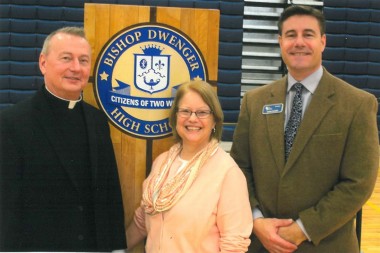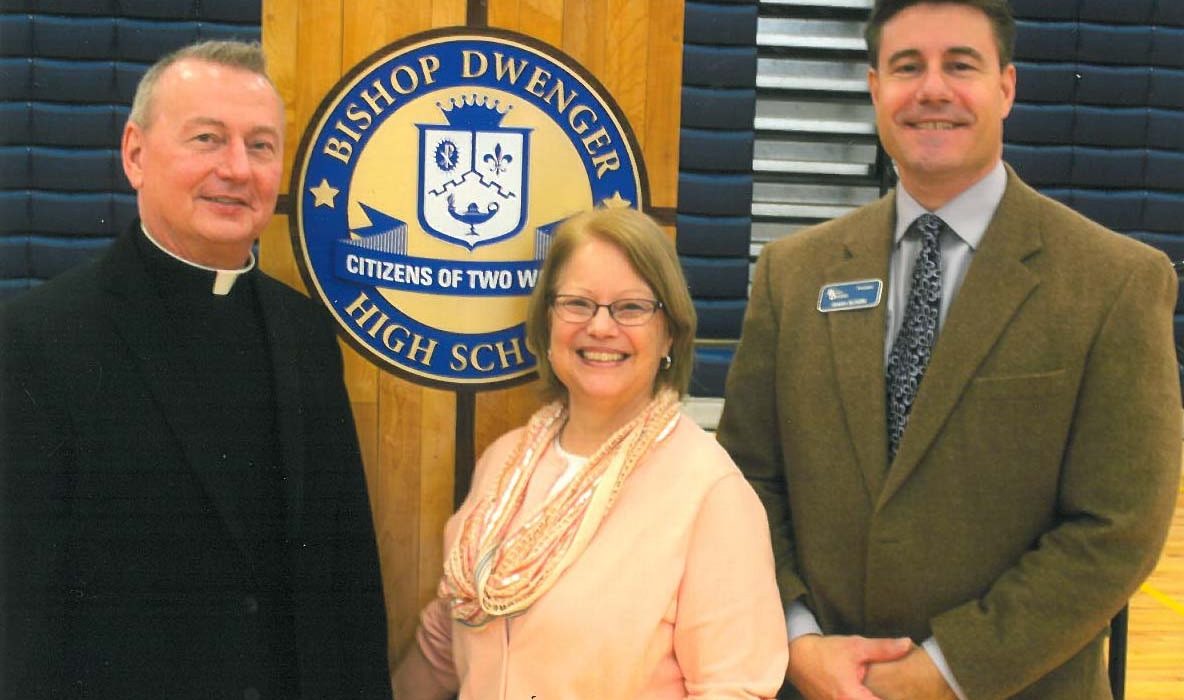March 22, 2017 // Local
Poverty and ‘signs of death’; priest recounts CRS trip
When Father Neil Kookoothe went to a small war-torn country in the Horn of Africa, he expected to encounter poverty.
“What I saw opened my eyes,” he told students at Bishop Dwenger High School in Fort Wayne last week. “Opulence and wealth, side by side with poverty, squalor and the smell of human needs.”
Father Kookoothe was talking about Eritrea, one of three countries he and a group of other clerics experienced as part of an effort to acquaint them with Catholic Relief Services, so they could inform others – like students at Bishop Dwenger – about the little-known relief program that helps millions of people annually. He talked with students, faculty and guests for about 30 minutes, then answered questions and elaborated on his experiences.
He and his group traveled to Eritrea, a country that recently fought a war with Ethiopia; Rwanda, a country in central Africa where, during a 10-day period in 1994, as many as 800,000 people were killed in a genocidal war between the Tutsi and Hutus; and Haiti, where in 2010 a catastrophic magnitude-7.0 earthquake killed an estimated 80,000 people.

Father Neil Kookoothe, left, addressed the Bishop Dwenger High School student body in Fort Wayne on March 7, sharing details of his recent Catholic Relief Services trip to three nations experiencing crippling poverty. He is pictured with Laura LaMaster, faculty advisor for CRS, and Jason Schiffli, principal.
Father Kookoothe’s presentation opened the eyes of nearly 1,000 Bishop Dwenger students, including those of Jessica Gabet. “I didn’t realize all the misery,” said the 11th grader. Neither did Tiffany Goodman, a freshman. “We really have it good,” she said. Another student, sophomore Emmett Delaney, said the presentation made him think about the plight of others.
In Asmara, the capital of Eritrea, Father Kookoothe’s group was encountered beautiful houses, modern buildings and a city of considerable wealth. A closer look, however, revealed cardboard lean-tos, shantytowns and people living in filth.
His group was escorted to the city of Ghinda by Land Rover, over carefully marked trails. “There were no paved roads,” Father Kookoothe said, “and drivers were careful to avoid thousands of land mines left over from the country’s war of independence from Ethiopia.”
In Ghinda the poverty was more overwhelming, with people in tattered clothing living in hovels and huts. But there was no dearth of hospitality. “People were curious about the visitors from the United States,” he said, staring and sometimes reaching out to touch their white skins.
His group brought rice, beans and other essentials, Father Kookoothe said. “But people didn’t realize we were there to help them, and they invited us into their homes to eat. I felt guilty eating their food, but declining would be a major insult.”
In Rwanda, hundreds of miles to the south, his group encountered a country still recovering from the 1994 genocidal civil war. “Mothers were hacked to death with machetes while holding babies in their arms,” Father Kookoothe said, with many slaughtered in the churches or schools where they sought refuge.
Even though it had been 14 years since the genocide, signs of death were everywhere, Father Kookoothe said, with mass graves and human remains piled up in in some places as a reminder of man’s inhumanity to man.
CRS was there, working to feed the poor and bring back some degree of tranquility. Some of that reconciliation took place in open courts, he explained, “not courts to prove guilt,” but courts that helped people come together again.
“I thought I had seen the worst in Eritrea and Rwanda,” Father Kookoothe said. “But I was not prepared for what I saw in Haiti. I am a different man today for having spent a week there.”
The minute he stepped off the plane, the priest said, “I wanted to leave. There were smoldering waist-deep piles of trash lining the streets of the capital city of Port Au Prince.” Buildings had collapsed, churches collapsed and the government collapsed, he said.
“Senses were assaulted at every turn. Everything was in ruins and chaos was everywhere.” Displaced people were living in tents pitched on golf courses and other open areas where they wouldn’t be crushed by aftershocks.
In meetings with tribal leaders, the priest continued, people asked: Do people in the United States know about us? As long as people in the U.S. knew of their plight, Father Kookoothe said, “the people of Haiti felt they had reason to hope.”
That’s where CRS made a difference, he continued. “We brought food, clothing and other essentials,” he said, “and we brought hope.”
Following the presentation, Dwenger Principal Jason Schiffli offered to give Father Kookoothe a stipend for the well-received presentation. The priest refused, however, instead asking that Rice Bowels be place in classrooms where students and others might contribute loose change to support CRS.
“We’ll put it to good use,” Father Kookoothe said.
The best news. Delivered to your inbox.
Subscribe to our mailing list today.






